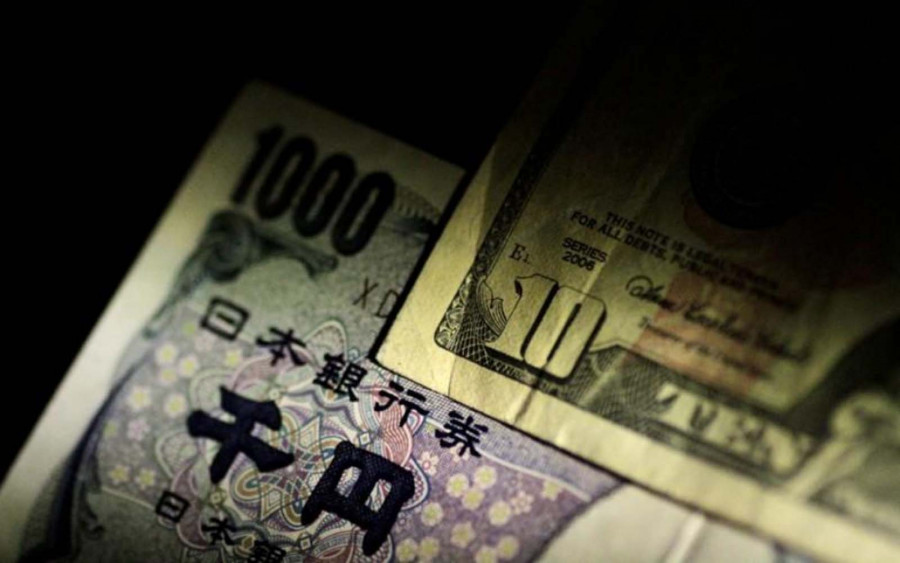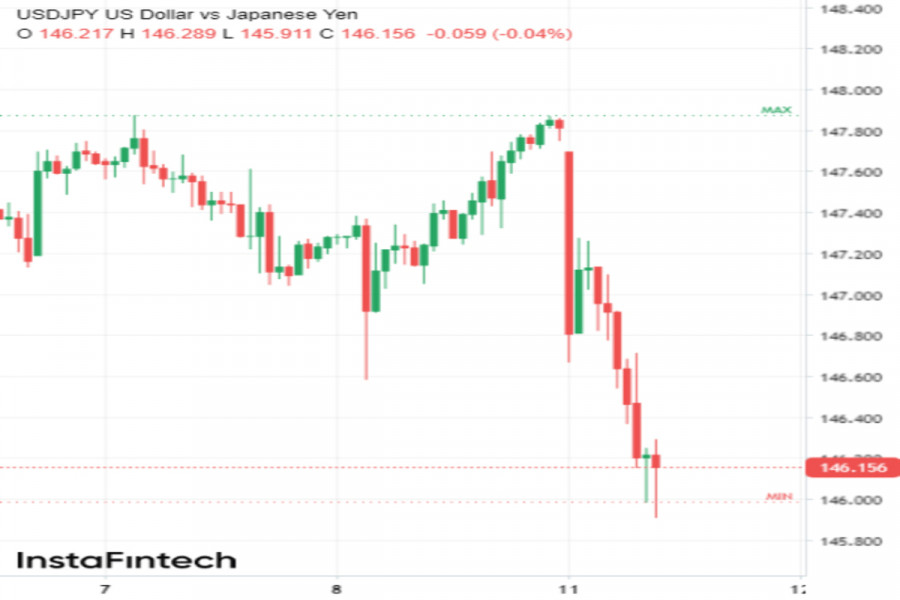Vea también


 11.09.2023 09:02 AM
11.09.2023 09:02 AMThe yen stormed into the new trading week, showing a strong acceleration against all major currencies, with the most notable rise against the US dollar. Let's dissect the reasons behind this JPY rally and its potential duration.
The bullish momentum that the USD/JPY pair enjoyed throughout the past week abruptly ended this Monday morning, with the pair plunging by over 1% to 146.15.
Just a week ago, the pair reached a 10-month high of 147.87, driven largely by hawkish market sentiment concerning the future monetary policies of the Federal Reserve.
Currently, while a majority of traders anticipate a pause in interest rate hikes at the upcoming FOMC meeting in September, the market is not completely ruling out further tightening in the US.
Robust economic data released last week has heightened the likelihood of another rate hike in the US this year, reinforcing the belief that the Federal Reserve might sustain a high rate for an extended period.
Given these dynamics, the dollar evidently enjoys strong support. So, what caused the USD/JPY pair to fall at the start of this week?
The significant catalyst behind the decline can be traced back to a Saturday interview with the Bank of Japan's Governor, Kazuo Ueda, given to the Yomiuri publication. Traders perceived his remarks as distinctly hawkish.
In his conversation, Ueda noted that the BOJ might abandon its ultra-loose monetary policy once there are signs of inflation approaching the 2% target.
"If we witness sustainable price increases, accompanied by wage growth, we won't have to wait for inflation to reach the target. Our inflation goal might be achieved even after we depart from negative rates," Ueda explained.
Ueda mentioned that the central bank would have sufficient data by the end of the year to decide whether they can begin normalizing their monetary policy.
Such statements reintroduced speculation that the BOJ might soon embark on the path of monetary tightening. This resulted in a spike in the yield of Japanese government bonds.
This morning, the yield jumped by 5 basis points to 0.7% — the highest since January 2014 — serving as a robust springboard for the yen.
A further strengthening of hawkish market expectations concerning the BOJ's monetary policy may bolster the Japanese currency. This could potentially lead to even more weakening of the USD/JPY pair in the near future.
"In light of recent events, our forecast concerning the Bank of Japan has shifted. Presently, we anticipate the regulator to abandon its negative interest rate policy within the first three months of 2024, leading to a pronounced surge in the yen against the US dollar," said Takeshi Ishida, currency strategist at Resona Bank.
However, not all experts share this optimism towards the yen. Some of them believe that USD/JPY might resume its upward trajectory once the market's emotional turbulence calms down.
The yield of US 10-year treasury bonds is currently about 360 basis points higher compared to the Japanese bonds. With such a vast disparity, the yen might struggle to maintain its victory over the US dollar, particularly as its recent gains are based on mere speculation rather than evidence.
No matter how hawkish he sounded in the recent interview, Ueda still reiterated his dovish stance. The official emphasized that the BoJ will maintain its ultra-loose stance in the foreseeable future as there is no discernible evidence of Japan nearing its inflation targets.
Recent data revealed that the wage growth rate for Japanese workers unexpectedly slowed down in June. This suggests a cooling labor market, casting a shadow over the BoJ's objectives regarding stable prices.
According to Kiesi Ishigane, an analyst at Mitsubishi UFJ Kokusai Asset Management, "the Bank of Japan currently has no basis to move towards normalizing its monetary policy. While it might end its yield curve control policy this year, this unlikely signifies a retreat from negative rates. We suspect Ueda's hawkish comments were mainly aimed at bolstering the flagging yen."
A similar view is held by his colleague, Naomi Muguruma. She believes Ueda's hawkish rhetoric was strategically employed to prevent further devaluation of the Yen, especially when Tokyo cannot feasibly intervene in the currency market.
"The yen's decline this year is markedly less than it was last year, indicating that its current depreciation is not purely speculative, complicating potential interventions in purchasing the Japanese currency," noted Muguruma.
A majority of analysts recommend that traders of the USD/JPY pair stay cautious and await key macroeconomic releases from the US this week, specifically, the Consumer Price Index report on Wednesday, followed by the Producer Price Index (PPI) and retail sales data on Thursday.
If the data turns out to be strong, the US dollar will likely receive a boost. With growing hawkish expectations regarding the Federal Reserve's policy, it wouldn't be surprising to see the greenback regaining its recent highs against the yen.
You have already liked this post today
*El análisis de mercado publicado aquí tiene la finalidad de incrementar su conocimiento, más no darle instrucciones para realizar una operación.
Según observaciones de analistas, el ciclo actual del Bitcoin es diferente a los anteriores. Los expertos atribuyen esto no solo a la volatilidad actual de la primera criptomoneda
El metal amarillo ha ocupado un lugar de honor entre los activos más demandados y no piensa detenerse en lo logrado. El precio del oro sigue creciendo con seguridad, superando
La primera criptomoneda se encuentra en un estado de "descomposición": no logra encontrar un punto de apoyo. El Bitcoin está experimentando una volatilidad significativa, habiendo mostrado una caída esta semana
Ayer se supo que, a partir de la próxima semana, el presidente de Estados Unidos, Donald Trump, impondrá aranceles del 25% a la importación de automóviles. Esta noticia provocó turbulencias
La sesión de negociación en EE. UU. del martes trajo noticias interesantes para los participantes del mercado: los futuros de gas natural subieron repentinamente, mientras que el petróleo decidió tomarse
InstaForex en cifras

Your IP address shows that you are currently located in the USA. If you are a resident of the United States, you are prohibited from using the services of InstaFintech Group including online trading, online transfers, deposit/withdrawal of funds, etc.
If you think you are seeing this message by mistake and your location is not the US, kindly proceed to the website. Otherwise, you must leave the website in order to comply with government restrictions.
Why does your IP address show your location as the USA?
Please confirm whether you are a US resident or not by clicking the relevant button below. If you choose the wrong option, being a US resident, you will not be able to open an account with InstaTrade anyway.
We are sorry for any inconvenience caused by this message.


